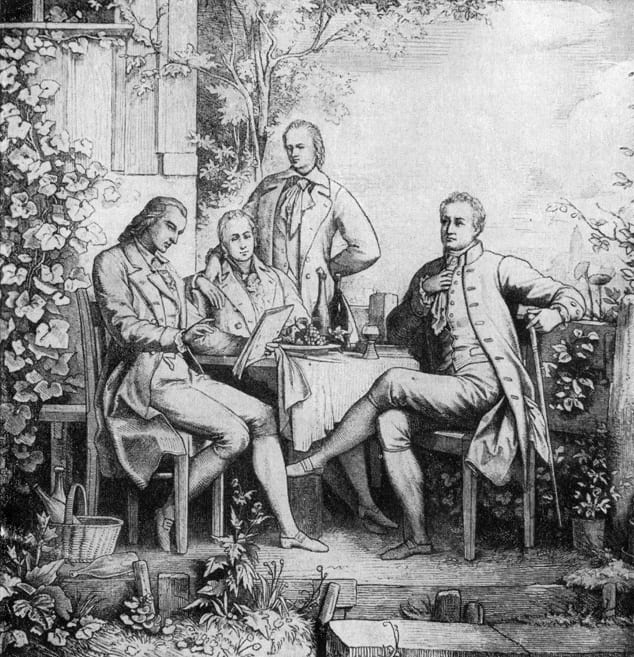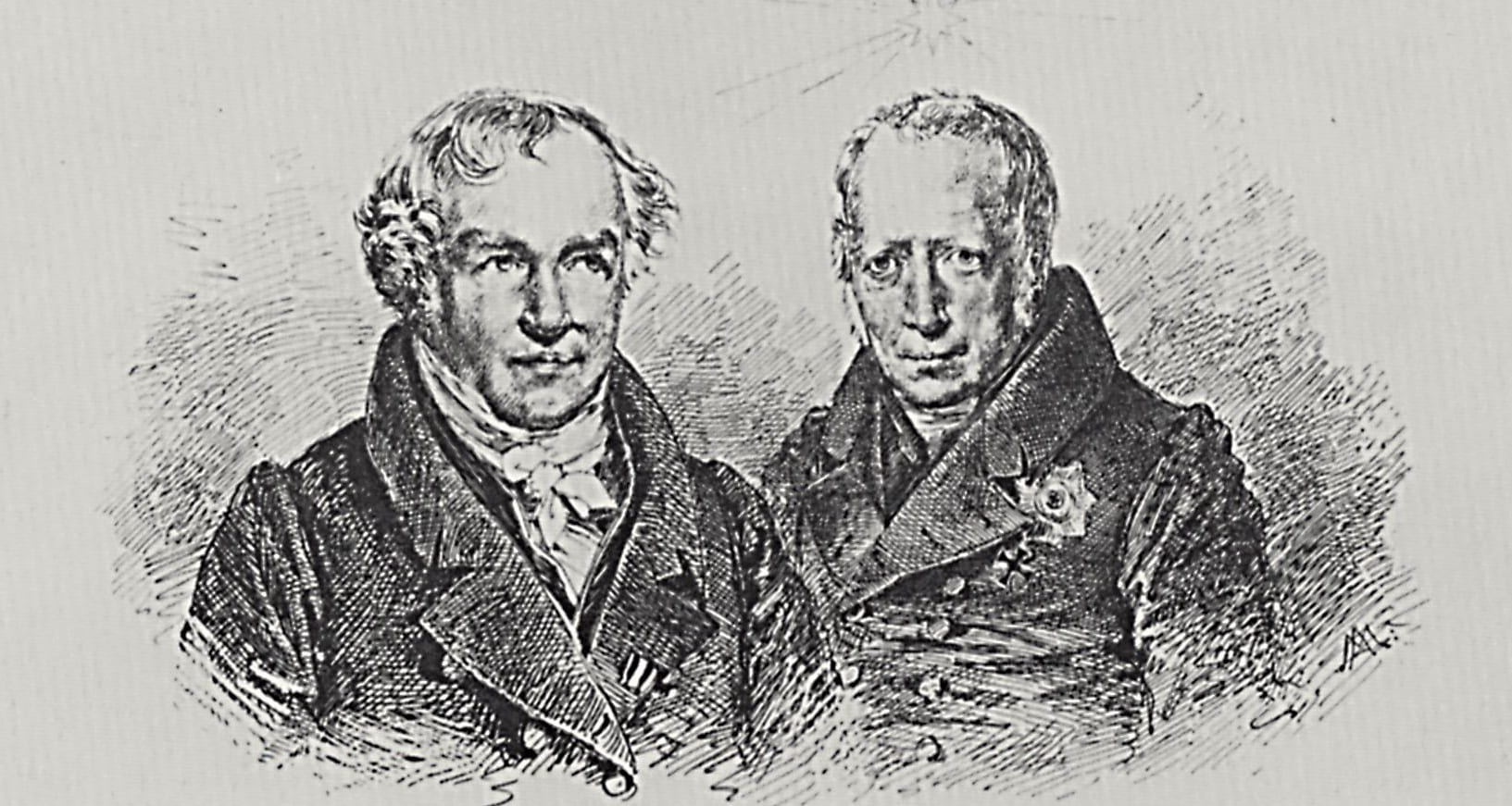By guest contributor Audrey Borowski
At the beginning of the nineteenth century, a young German polymath ventured into the heart of the South American jungle, climbed the Chimborazo volcano, crawled through the Andes, conducted experiments on animal electricity, and delineated climate zones across continents. His name was Alexander von Humboldt (1769–1859). With the young French scientist Aimé Bonpland and equipped with the latest instruments, Humboldt tirelessly collected and compared data and specimens, returning after five years to Paris with trunks filled with notebooks, sketches, specimens, measurements, and observations of new species. Throughout his travels in South America, Russia and Mongolia, he invented isotherms and formulated the idea of vegetation and climate zones. Crucially, he witnessed the continuum of nature unfold before him and set forth a new understanding of nature that has endured up to this day. Man existed in a great chain of causes and effects in which “no single fact can be considered in isolation.” Humboldt sought to discover the “connections which linked all phenomena and all forces of nature.” The natural world was teeming with organic powers that were incessantly at work and which, far from operating in isolation, were all “interlaced and interwoven.” Nature, he wrote, was “a reflection of the whole” and called for a global understanding. Humboldt’s Essay on the Geography of Plants (1807) was the world’s first book on ecology in which plants were grouped into zones and regions rather than taxonomic units and analogies drawn between disparate regions of the globe.
In this manner, Alexander sketched out a Naturgemälde, a “painting of nature” that fused botany, geology, zoology and physics in one single picture, and in this manner broke away from prevailing taxonomic representations of the natural world. His was a fundamentally interdisciplinary approach, at a time when scientific inquiry was becoming increasingly specialized. The study of the natural world was no abstract endeavor and was far removed from the mechanistic philosophy that had held sway up till then. Nature was the object of scientific inquiry, but also of wonder and as such, it exerted a mysterious pull. Man was firmly relocated within a living cosmos broader than himself, which appealed equally to his emotions and imagination. From the heart of the jungle to the summit of volcanoes, “nature everywhere [spoke] to man in a voice that is familiar to his soul” and what spoke to the soul, Humboldt wrote, “escapes our measurements” (Views of Nature, 217-18). In this manner Humboldt followed in the footsteps of Goethe, his lifelong friend, and the German philosopher Friedrich Schelling, in particular the latter’s Naturphilosophie (“philosophy of nature”). Nature was a living organism it was necessary to grasp in its unity, and its study should steer away from “crude empiricism” and the “dry compilation of facts” and instead speak to “our imagination and our spirit.” In this manner, rigorous scientific method was wedded to art and poetry and the boundaries between the subjective and the objective, the internal and the external were blurred. “With an aesthetic breeze,” Alexander’s long-time friend Goethe wrote, the former had lit science into a “bright flame” (quoted in Wulf, The Invention of Nature, 146).
Alexander von Humboldt’s older brother, Wilhelm (1767-1835), a government official with a great interest in reforming the Prussian educational system, had been similarly inspired. While his brother had ventured out into the jungle, Wilhelm, on his side, had devoted much of his life to the exploration of the linguistic realm, whether in his study of Native American and ancient languages or in his attempts to grasp the relation between linguistic and mental structures. Like the German philosopher and literary critic Johann Gottfried Herder before him, Humboldt posited that language, far from being a merely a means of communication, was the “formative organ” (W. Humboldt, On the Diversity of Human Language, 54) of thought. According to this view, man’s judgmental activity was inextricably bound up with his use of language. Humboldt’s linguistic thought relied on a remarkable interpretation of language itself: language was an activity (energeia) as opposed to a work or finished product (ergon). In On the Diversity of Human Language Construction and its Influence on the Mental Development of the Human Species (1836), his major treatise on language, Wilhelm articulated a forcefully expressivist conception of language, in which he brought to bear the interconnectedness and organic nature of all languages and by extension, various worldviews. Far from being a “dead product,” an “inert mass,” language appeared as a “fully-fashioned organism” that, within the remit of an underlying universal template, was free to evolve spontaneously, allowing for maximum linguistic diversity (90).

Left to Right: Friedrich Schiller, Wilhelm von Humboldt, Alexander von Humboldt, and Johann Wolfgang von Goethe, depicted by Adolph Müller (c.1797)
To the traditional objectification of language, Wilhelm opposed a reading of language that was heavily informed by biology and physiology, in keeping with the scientific advances of his time. Within this framework, language could not be abstracted, interwoven as it was with the fabric of everyday life. Henceforth, there was no longer one “objective” way of knowing the world, but a variety of different worldviews. Like his brother, Wilhelm strove to understand the world in its individuality and totality.
At the heart of the linguistic process lay an in-built mechanism, a feedback loop that accounted for language’s ability to generate itself. This consisted in the continuous interplay between an external sound-form and an inner conceptual form, whose “mutual interpenetration constitute[d] the individual form of language” (54). In this manner, rhythms and euphonies played a role in expressing internal mental states. The dynamic and self-generative aspect of language was therefore inscribed in its very core. Language was destined to be in perpetual flux, renewal, affecting a continuous generation and regeneration of the world-making capacity powerfully spontaneous and autonomous force, it brought about “something that did not exist before in any constituent part” (473).
As much as the finished product could be analyzed, the actual linguistic process defied any attempt at scientific scrutiny, remaining inherently mysterious. Language may well abide by general rules, but it was fundamentally akin to a work of art, the product of a creative outburst which “cannot be measured out by the understanding” (81). Language, as much as it was rule-governed and called for empirical and scientific study, originated somewhere beyond semio-genesis. “Imagination and feeling,” Wilhelm wrote, “engender individual shapings in which the individual character […] emerges, and where, as in everything individual, the variety of ways in which the thing in question can be represented in ever-differing guises, extends to infinity” (81). Wilhelm therefore elevated language to a quasi-transcendental status, endowing it with a “life-principle” of its own and consecrating it as a “mental exhalation,” the manifestation of a free, autonomous spiritual force. He denied that language was the product of voluntary human activity, viewing instead as a “mental exhalation,” a “gift fallen to [the nations] by their own destiny” (24) partaking in a broader spiritual mission. In this sense, the various nations constituted diverse individualities pursuant of inner spiritual paths of their own, with each language existing as a spiritual creation and gradual unfolding:
If in the soul the feeling truly arises that language is not merely a medium of exchange for mutual understanding, but a true world which the intellect must set between itself and objects by the inner labour of its power, then the soul is on the true way toward discovering constantly more in language, and putting constantly more into it (135).
While he seemed to share his brother’s intellectual demeanor, Wilhelm disapproved of many of Alexander’s life-choices, from living in Paris rather than Berlin (particularly during the wars of liberation against Napoleon), which he felt was most unpatriotic, to leaving the civilized world in his attempts to come closer to nature (Wulf 151). Alexander, the natural philosopher and adventurer, on his side reproached his brother for his conservatism and social and political guardedness. In a time marred by conflict and the growth of nationalism, science, for him, had no nationality and he followed scientific activity wherever it took him, especially to Paris, where he was widely celebrated throughout his life. In a European context of growing repression and censorship in the wake of Napoleon’s defeat, he encouraged the free exchange of ideas and information, and pleaded for international collaborations between scientists and the collection of global data; truth would gradually emerge from the confrontation of different opinions. He also gave many lectures during which he would effortlessly hop from one subject to another, in this manner helping to popularize science. More generally, he would help other scholars whenever he could, intellectually or financially.
As the ideas of 1789 failed to materialize, giving way instead to a climate of censorship and repression, Alexander slowly grew disillusioned with politics. His extensive travels had provided him insights not only on the natural world but also on the human condition. “European barbarity,” especially in the shape of colonialism, tyranny and serfdom had fomented dissent and hatred. Even the newly-born American Republic, with its founding principles of liberty and the pursuit of happiness, was not immune to this scourge (Wulf 171). Man with his greed, violence and ignorance could be as barbaric to his fellow man as he was to nature. Nature was inextricably linked with the actions of mankind and the latter often left a trail of destruction in its wake through deforestation, ruthless irrigation, industrialization and intensive cultivation. “Man can only act upon nature and appropriate her forces to his use by comprehending her laws.” Alexander would later write in his life, and failure to do so would eventually leave even distant stars “barren” and “ravaged” (Wulf 353).
Furthermore, while Wilhelm was perhaps the more celebrated in his time, it was Alexander’s legacy that would prove the more enduring, inspiring new generations of nature writers, including the American founder of the transcendentalist movement Henry David Thoreau, who intended his masterpiece Walden as an answer to Humboldt’s Cosmos, John Muir, the great preservationist, or Ernst Haeckel, who discovered radiolarians and coined our modern science of ecology” Another noteworthy influence was on Darwin and his theory of evolution. Darwin took Humboldt’s web of complex relations a step further and turned them into a tree of life from which all organisms stem. Humboldt sought to upend the ideal of “cultivated nature,” most famously perpetuated by the French naturalist the Comte de Buffon, whereby nature had to be domesticated, ordered, and put to productive use. Crucially, he inspired a whole generation of adventurers, from Darwin to Joseph Banks, and revolutionized scientific practice by tearing the scientist away from the library and back into the wilderness.
For all their many criticisms and disagreements, both brothers shared a strong bond. Alexander, who survived Wilhelm by twenty-four years, emphasized again and again Wilhelm’s “greatness of the character” and his “depth of emotions,” as well as his “noble, still-moving soul life.” Both brothers carved out unique trajectories for themselves, the first as a jurist, a statesman and a linguist, the second arguably as the first modern scientist; yet both still remained beholden to the idea of totalizing systems, each setting forth insights that remain more pertinent than ever.

Alexander and Wilhelm von Humboldt, from a frontispiece illustration of 1836
Audrey Borowski is a historian of ideas and a doctoral candidate at the University of Oxford.



Leave a Reply